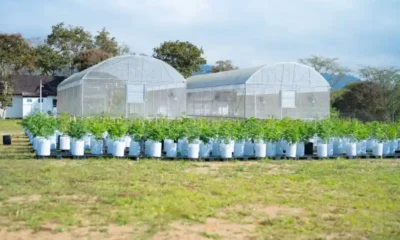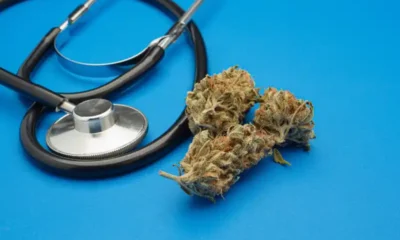Connect with us
Published
2 years agoon

With inflation on the rise alongside looming recession within the United States, the price of cannabis has so far remained relatively unaffected in legal states throughout the country. But what happens if and when inflation catches up to the cannabis industry, and how will consumers respond? One new survey seeks to find the answers, with results that could hit the new industry hard.
Inflation describes the effective devaluation of a currency through a reduction in its purchasing power. As things get more expensive, your dollar gets you less of what you want to buy.
The survey by CBD Oracle asked 1,450 Americans in adult-use cannabis states about the impact of inflation on their habits, the differences they’ve noticed and whether their behavior will change if the country’s current economic situation worsens.
Namely, around 46% of respondents said they would buy the same amount of cannabis, should inflation continue to increase, while 44% said they would buy less. The remaining respondents said they would buy more cannabis. In order of popularity, respondents said they’ve saved money on cannabis by buying products in bulk, buying cheaper weed, only buying if there’s a sale or simply by cutting down their consumption habits.
Everyday smokers were more likely to report purchasing consistent amounts of cannabis, even if prices increase, with 51% reporting they would buy the same amount.
While some state-level data has suggested a stagnation in cannabis prices, 57% respondents reported an increase in cannabis prices since 2021. Through the past year, 42% of respondents said they continued buying the same amount of cannabis, while 35% have increased their use and 23% have decreased it.
For those who changed the amount of cannabis they buy, the most commonly reported reason was due to health/lifestyle (29%), with 28% specifically citing inflation and 26% citing the economy in general.
Should inflation continue to rise, 44% of respondents said they would give up or cut down on dining out to afford more cannabis, while 38% said they would give up entertainment or going out, 29% would give up alcohol or tobacco and 28% would cancel Netflix.
Inflation tends to affect almost every aspect of life for consumers, though recent reports have shown that the cannabis industry has been relatively unaffected so far. CBD Oracle notes that things can be a bit more complicated, as prices aren’t only dependent on inflation.
“In large part, companies are not increasing their prices even though they are experiencing an inflation in their expenses (labor, non-cannabis input ingredients, cost of capital, etc) because the pressures of supply and demand within the cannabis market are acting in a stronger way to push down prices than inflation is placing on production costs,” explained Andrew Livingston, director of economics and research at Vicente Sederberg.
According to Livingston, the pandemic was a relative boom for the cannabis industry. They responded to the increased demand by increasing production. Though, as the pandemic continues to become more manageable, he said we are looking at a shift for the future.
“Over the last few months demand has waned as consumers rebalance their purchases across products and experiences and reduce both as inflation cuts into their pocketbook,” he said. “With supply remaining at its pandemic high and demand falling, an oversupplied legal cannabis market puts downward pressure on prices.”
Livingston and other experts have also indicated that cannabis sales can help benefit and protect local economies during times like this. Because all of the money spent on cannabis remains in-state, the industry often has a greater impact on local economies than other industries.
In the survey explanation, CBD Oracle also explores how federal cannabis legalization would affect the economy during times of inflation and recession. Tax revenue is the most obvious benefit, with New Frontier estimates finding the total tax revenue would reach $128.8 billion over a period of around seven years, assuming a 15% retail sales tax rate.
It’s also important to consider employment in this conversation, as New Frontier predicted that, had cannabis been legalized federally in 2019, there would be 1.63 million jobs in the industry by 2025. That’s more than a quarter of all currently unemployed people in the U.S.
“Our survey suggests that while increasing weed prices would lead to some reduction in purchases, generally speaking, about half of existing dispensary customers would buy the same amount or even more. This is especially true for everyday smokers,” the authors concluded. They admit there is also a difference between what consumers say they will do versus what they will really do, when push comes to shove.
“We’ll find out soon, with 30% of dispensaries set to further raise prices,” they added. “The major concern for these companies will undoubtedly be the other 70% taking their customers because they were willing to forgo profit to keep their prices down. Without some agreement at a local level, this will likely be a source of some friction among dispensaries and growers.”


Carmelo Anthony Launches Cannabis Brand


Santa Barbara County Approves Study To Address Ongoing Cannabis Odor


Kansas Medical Cannabis Proposal Dead for 2024


Psychedelic Research Proves Rather Tricky for the FDA


Psychedelic Drug Market Poised to Hit $4.6B by 2030


Chronic Pot Use Has Minimal Effect on Motivation, Study Shows
